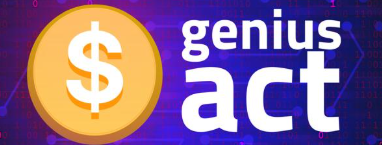The GENIUS Act: Guiding and Establishing National Innovation for U.S. Stablecoins
Introduction
As digital currencies and blockchain technologies evolve, stablecoins (viz cryptocurrencies pegged to stable assets like the U.S. dollar) have emerged as a major player in the financial ecosystem.
In response to both their rapid growth and the associated regulatory uncertainty, the GENIUS Act (Guiding and Establishing National Innovation for U.S. Stablecoins Act) was introduced to create a clear, federal regulatory framework for the issuance and oversight of stablecoins in the United States.
So what is the GENIUS Act?
Introduced in Congress in 2023, the GENIUS Act aims to provide a comprehensive legal structure for U.S. dollar-backed stablecoins.
The bill seeks to balance innovation and financial stability, promoting private-sector development of digital assets while ensuring regulatory safeguards are in place, The key elements of the act include:
- Regulatory clarity: Establishes guidelines for which federal agencies will oversee stablecoin issuers.
- Reserve requirements: Mandates that stablecoins be backed 1:1 with high-quality liquid assets, like U.S. dollars or Treasuries.
- Issuer registration: Requires stablecoin issuers to register with a federal authority (likely the Treasury Department or a similar body).
- Consumer protection: Implements disclosure and transparency standards to protect users.
What are the pros or advantages of the act:
- Regulatory Certainty: It creates a clear legal framework that encourages responsible innovation while minimizing legal ambiguity.
- Market Stability: Its reserve and transparency requirements can reduce the risk of runs or failures seen in some prior stablecoin projects.
- U.S. Leadership: It helps the U.S. maintain a leading role in digital currency innovation globally, especially in the face of competition from China’s digital yuan and other central bank digital currencies (CBDCs).
- Consumer Protection: It provides strong oversight that reduces fraud risk and promotes user trust in stablecoin products.
- Private Sector Involvement: It encourages a competitive ecosystem of private stablecoin issuers, avoiding full government control of digital dollars.
What are its issues and / or disadvantages
- Compliance Burden: Some smaller or startup projects may struggle with registration and reserve requirements, possibly stifling innovation and increasing costs/complexity.
- Fragmented Oversight Risks: If not well-coordinated across agencies (e.g., SEC, CFTC, Treasury), then it could lead to regulatory confusion or conflict.
- Is it too Industry-Friendly?: Some critics worry it may be too lenient on private issuers, potentially prioritizing growth over security.
- Shadow Banking Concerns: Without careful oversight, stablecoins could act like unregulated banks, introducing systemic risk to the financial system.
Conclusion
The GENIUS Act represents a major step toward integrating stablecoins into the regulated U.S. financial system.
By offering a framework that encourages innovation while demanding accountability, the Act could position the U.S. as a leader in digital financial infrastructure.
However, the effectiveness of the legislation will depend heavily on how it is implemented, enforced, and adapted over time.
Striking the right balance between innovation, consumer protection, and systemic risk will be key.


Recent Comments